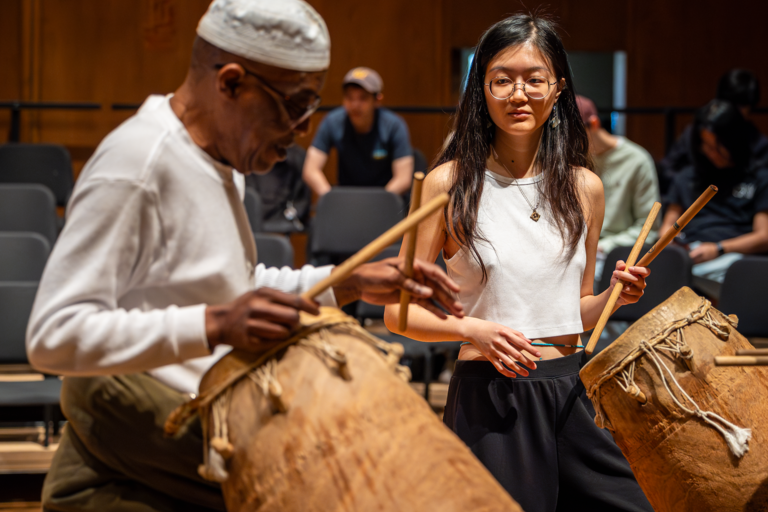African Music Ensemble Information
Instructor: C.K. Ladzekpo
Course number: Music 148
Dance-drumming in sub-sahara African tradition is not only a fulfilling creative art, but also an ancient institution of learning and perhaps the nerve system in the development of the sub-saharan human infrastructure. Among its most important activities in implementing the sub-saharan collective agenda, it serves as an essential catalyst for articulating traditional praise-worthy attributes, manifesting them into images of life, putting them on display, and crowning them with glory for the elevation of participants as well as spectators. Dance-drumming, in a sub-sahara African tradition, is a drama of people performing well in life. A cursory glance through the annals of sub-saharan dance-drumming is not only a mere experience of some masterpieces of human creative art, but a fascinating adventure through essential dimensions of a civilization, its collective priorities, the skills of their implementation and the philosophies that inform them. In this course, we will examine the salient features of West African drum culture through discussions and practical performance.
Description/History
The African Music Ensemble has flourished since its first year in 1972-73 under the direction of master Ghanian musician C.K. Ladzekpo. Recruited by Professor Olly Wilson (composer and specialist in African American music), Ladzekpo took leave from his position at the Institute of African Studies at the University of Ghana to join the Berkeley faculty for one year. A music ensemble course was begun in the Department of Music, and an African dance course in the Department of African American Studies; the two student groups joined for concerts. In l974, lured by the community activity of the non-profit East Bay Center for the Performing Arts in offering free music lessons for “kids who couldn’t pay,” Ladzekpo began teaching there as well. As his ties in the Bay Area strengthened, one year led to another and the University has benefited from his presence for over three decades. When asked why he chose to remain in the United States, C.K. responds that he enjoys the new challenges of representing West African music to American students and audiences. Deeply interested in developing teaching methods to effectively communicate his music to foreign students, he has mapped out a process that involves lots of transcriptions of traditional repertoire from which new pieces for presentation can be created. For a number of years the African Music Ensemble in the Department of Music has encompassed both musical and dance instruction and all students do both. There is generally one concert each year in spring semester.

Instructors demonstrating drumming techniques during the African Music Ensemble class.


